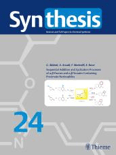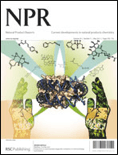
Natural Products and Bioprospecting
Scope & Guideline
Harnessing Nature's Wisdom for Groundbreaking Research
Introduction
Aims and Scopes
- Natural Product Chemistry:
Focus on the chemical structures, synthesis, and characterization of bioactive compounds derived from plants, fungi, and marine organisms. - Pharmacological Research:
Investigation of the biological activities of natural products, including their anti-inflammatory, anticancer, antiviral, and antimicrobial properties. - Bioprospecting and Ethnopharmacology:
Exploration of traditional knowledge and practices surrounding the use of natural products for medicinal purposes across different cultures. - Biotransformation and Metabolomics:
Study of the metabolic pathways and transformations of natural products and their derivatives in biological systems. - Environmental and Ecological Studies:
Research on the ecological impact of natural products and their potential for sustainable development and environmental conservation.
Trending and Emerging
- Natural Products in Drug Discovery:
An increasing number of studies focus on the role of natural products as lead compounds in drug discovery, particularly in addressing contemporary health crises such as cancer and viral infections. - Microbial Biotransformation:
Research on microbial metabolism of natural products is gaining momentum, showcasing the potential of fungi and bacteria in enhancing the therapeutic properties of natural compounds. - Functional Foods and Nutraceuticals:
There is a growing interest in the health benefits of dietary phytochemicals and their roles in disease prevention, reflecting an increased public awareness of nutrition and health. - Sustainable Bioprospecting:
Research emphasizing environmentally sustainable practices in the collection and use of natural resources is becoming a focal point, aligning with global sustainability goals. - Advanced Analytical Techniques:
The application of cutting-edge technologies, such as metabolomics and proteomics, to study natural products is on the rise, leading to deeper insights into their mechanisms of action and efficacy.
Declining or Waning
- Traditional Medicinal Practices:
Research related to the documentation and validation of traditional remedies is less frequently published, suggesting a potential shift towards more modern pharmacological approaches. - In-depth Phytochemical Analysis:
Although still relevant, the emphasis on extensive phytochemical profiling without direct application to health outcomes appears to be waning. - Basic Ethnobotany Studies:
Studies focusing solely on the ethnobotanical aspects without integrating pharmacological or biochemical analyses have become less common.
Similar Journals

Frontiers in Chemistry
Exploring Diverse Dimensions of Chemical Science.Frontiers in Chemistry is an esteemed and innovative Open Access journal published by FRONTIERS MEDIA SA, based in Lausanne, Switzerland. Since its inception in 2013, the journal has established itself as a leading platform for the dissemination of high-quality research across a broad spectrum of chemistry disciplines, achieving a notable Q1 classification in the miscellaneous chemistry category as of 2023. With an impressive Scopus rank, placing it at 72nd out of 408 in General Chemistry and falling within the 82nd percentile, Frontiers in Chemistry is committed to publishing significant findings that contribute to the advancement of the field. The journal's Open Access model ensures that research is freely accessible to all, fostering a greater exchange of knowledge and collaboration among researchers, professionals, and students globally. It covers a range of topics, from organic and inorganic chemistry to materials science and biochemistry, making it an essential resource for anyone seeking to stay at the forefront of chemical research.

RUSSIAN JOURNAL OF BIOORGANIC CHEMISTRY
Fostering Collaboration in Life Sciences ResearchRussian Journal of Bioorganic Chemistry (ISSN: 1068-1620, E-ISSN: 1608-330X), published by MAIK Nauka/Interperiodica/Springer, serves as a vital resource for researchers and professionals in the fields of bioorganic chemistry, biochemistry, and organic chemistry. With a focus on the integration of organic chemistry principles with biological processes, this journal aims to disseminate significant findings and advancements from both theoretical and practical perspectives. Although currently not open access, the journal retains a dedication to high-quality, peer-reviewed content, contributing to its reputation within the academic community. The 2023 Scopus rankings position it within the Q4 category for both biochemistry and organic chemistry, indicating its critical niche within these disciplines amid a competitive landscape. Since its inception in 1996, the journal has continued to evolve, providing enriching insights and fostering collaborations among scholars and practitioners alike, with publication converging up to the year 2024. By exploring complex biomolecular interactions and the synthesis of biologically relevant compounds, the Russian Journal of Bioorganic Chemistry remains a significant platform for advancing knowledge and innovation in the life sciences.

Bulletin of the University of Karaganda-Chemistry
Fostering Collaboration in Chemical Research ExcellenceBulletin of the University of Karaganda-Chemistry is an esteemed academic journal published by KARAGANDA STATE UNIVERSITY, focusing on the field of chemistry and related disciplines. With an ISSN of 2518-718X and an E-ISSN of 2663-4872, this journal aims to disseminate high-quality research articles, reviews, and scholarly discussions that contribute to the advancement of knowledge in chemistry. Although it has experienced a transition in its coverage from 2021 to 2022, the journal remains a significant platform for researchers and students alike, promoting open access to its valuable content. Despite its current Scopus rank of #379/407 in the general chemistry category, the Bulletin of the University of Karaganda-Chemistry serves as a vital resource for the academic community in Kazakhstan and beyond, fostering collaboration and innovation in various chemical research domains. Researchers, professionals, and students are encouraged to engage with the journal as it continues to evolve and contribute to significant scientific discussions.

JOURNAL OF THE CHILEAN CHEMICAL SOCIETY
Elevating Chemical Research with Open Access Insights.The Journal of the Chilean Chemical Society, published by the Sociedad Chilena de Química, serves as a premier platform for disseminating significant research findings in the field of Chemistry. With an ISSN of 0717-9707, this journal has established its presence since 2003, providing open access to a diverse range of studies and advancements in this vital scientific domain. It currently holds a Q3 category ranking in Chemistry (miscellaneous) and ranks 196 out of 408 in the general chemistry category on Scopus, indicating its valuable contributions to the field. Through the journal, researchers, professionals, and students are encouraged to engage with cutting-edge research and foster collaboration among the scientific community in Chile and beyond. The society's commitment to excellence ensures that articles published reflect high-quality research, underpinning the journal’s role in shaping knowledge and innovation in chemistry.

SYNTHESIS-STUTTGART
Advancing the Frontiers of Organic Chemistry and Catalysis.SYNTHESIS-STUTTGART
Published by the esteemed Georg Thieme Verlag KG, SYNTHESIS-STUTTGART stands as a vital resource in the field of Chemistry, specifically focusing on Organic Chemistry and Catalysis. With an impressive publication history dating back to 1970 and continuing through 2024, it serves as a platform for innovative research and developments in synthetic methodologies and their applications. The journal holds a significant impact factor, reflecting its influence within the academic community, and is recognized in the Scopus rankings as a reputable source in its categories, with a rank of #99/211 in Organic Chemistry and #43/68 in Catalysis. Researchers, professionals, and students alike can benefit greatly from its content, which upholds rigorous peer-review standards and contributes to the global discourse in these critical scientific domains.

CHEMISTRY OF NATURAL COMPOUNDS
Unveiling Nature's Secrets with Chemical PrecisionChemistry of Natural Compounds is a premier academic journal dedicated to the intersection of natural products and modern chemistry, published by Springer. Since its inception in 1965, this journal has published innovative research articles, reviews, and discussions that focus on the chemistry and biochemistry of natural compounds, with an emphasis on their applications in various fields including medicine, agriculture, and environmental science. Recognized for its contributions to the scientific community, the journal is indexed in key databases and holds a respectable impact factor that underscores its relevance in the academic landscape. Currently ranked in the Q3 category across multiple disciplines, including Biochemistry, Genetics and Molecular Biology, Chemistry, and Plant Science, it serves as a critical resource for researchers and professionals aiming to deepen their understanding of the complex interactions between natural compounds and biological systems. While not an open-access journal, Chemistry of Natural Compounds provides valuable insights and essential findings that can aid in advancing both theoretical and applied sciences for researchers, students, and industry practitioners alike.

JOURNAL OF THE CHEMICAL SOCIETY OF PAKISTAN
Advancing Chemistry, Enriching Knowledge.JOURNAL OF THE CHEMICAL SOCIETY OF PAKISTAN is a premier academic journal published by the Chemical Society of Pakistan, focusing on advancing the field of chemistry through rigorous research and scholarship. Established in 1996, this journal aims to disseminate high-quality research articles, reviews, and insights pertaining to various subfields of chemistry, making substantial contributions to both local and international scientific communities. With a current impact factor placing it in the Q4 category, the journal continues to foster discussions on emerging trends and innovations within the discipline. Additionally, it holds a Scopus rank of #305 out of 408, highlighting its growing influence despite being positioned in the 25th percentile. Although it is not an open-access journal, it provides a crucial platform for researchers and professionals in Pakistan and worldwide. The JOURNAL OF THE CHEMICAL SOCIETY OF PAKISTAN serves as a valuable resource for students, educators, and industry professionals alike, facilitating the exchange of knowledge and promoting advancements in chemical sciences.

NATURAL PRODUCT REPORTS
Advancing Knowledge in Natural Product ResearchNATURAL PRODUCT REPORTS, published by the Royal Society of Chemistry, is a premier interdisciplinary journal that specializes in the field of natural product chemistry. With an impressive impact reflected in its 2023 quartile rankings, it holds a Q1 status in key categories including Biochemistry, Drug Discovery, and Organic Chemistry, highlighting its significance and influence in these areas. The journal, which has been disseminating groundbreaking research since its inception in 1984, serves as a vital resource for researchers, professionals, and students dedicated to advancing the understanding and application of natural products in various scientific contexts. Although it does not offer open access, the journal provides a plethora of insightful reviews and seminal articles that contribute to the collective knowledge and innovation within the natural product community. With a commitment to excellence, NATURAL PRODUCT REPORTS continues to foster collaboration and inspire future breakthroughs in the field.

Journal of Natural Medicines
Pioneering Discoveries in Organic Chemistry and Herbal ScienceJournal of Natural Medicines, published by SPRINGER JAPAN KK, is a leading academic journal that plays a pivotal role in the advancement of research in the fields of Complementary and Alternative Medicine, Drug Discovery, Molecular Medicine, Organic Chemistry, and Pharmaceutical Science. Established in 1994 and set to continue until 2024, this journal serves as a vital conduit for the dissemination of groundbreaking research and innovative ideas that bridge traditional medicinal knowledge and modern scientific inquiry. With its impressive ranking in Scopus—ranking #12 out of 105 in Complementary and Alternative Medicine and holding a Q1 category quartile for 2023—it stands as a reputable source for high-quality, peer-reviewed articles. The journal's commitment to excellence is further underscored by its inclusion in the Springer network, providing researchers, professionals, and students with valuable insights and the latest developments in natural medicines. Although this journal operates under a subscription model, its profound impact on these interdisciplinary fields makes it an essential resource for anyone engaged in the study or practice of natural medicinal therapies.

Journal of Essential Oil Bearing Plants
Transforming Chemistry through Essential OilsJournal of Essential Oil Bearing Plants, published by Taylor & Francis Ltd, is a peer-reviewed academic journal that plays a critical role in the field of essential oils and their applications in analytical chemistry, biochemistry, and organic chemistry. With an ISSN of 0972-060X and an E-ISSN of 0976-5026, this journal has been a valuable resource since its inception in 2003 and continues to publish cutting-edge research through 2024. The journal is classified in the Q2 category for Analytical Chemistry and Q3 for both Biochemistry and Organic Chemistry as of 2023, reflecting its high citation impact and relevance in these scientific domains. Researchers and practitioners will find a wealth of knowledge in its pages, showcasing innovative methodologies and findings that advance our understanding of essential oils and their diverse applications. While the journal does not currently offer Open Access options, its rigorous peer-review process ensures that published studies maintain the highest standards of scientific integrity. Located in the United Kingdom, the Journal of Essential Oil Bearing Plants is dedicated to disseminating essential research findings to a global audience, thereby facilitating ongoing dialogue and development in this important field.